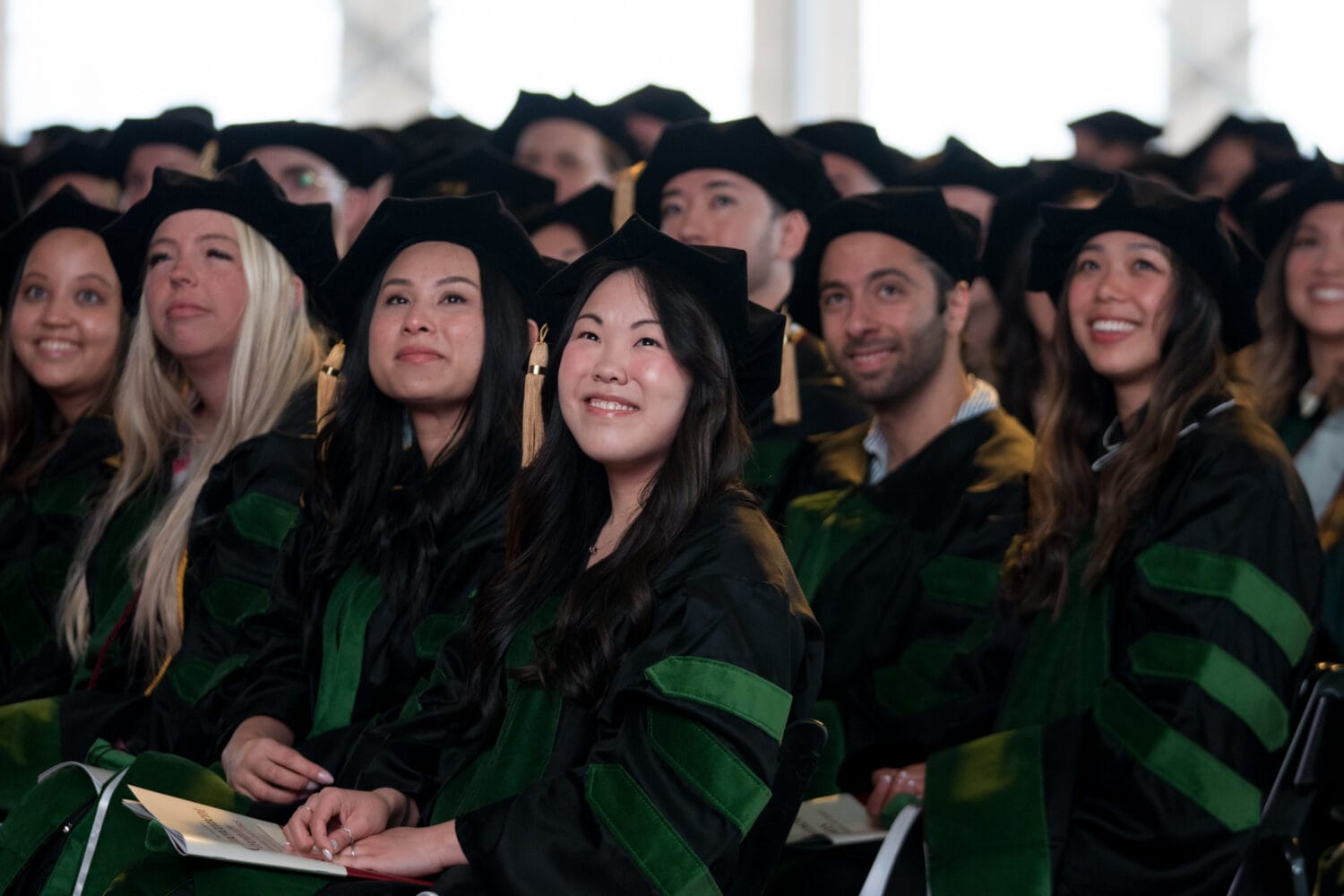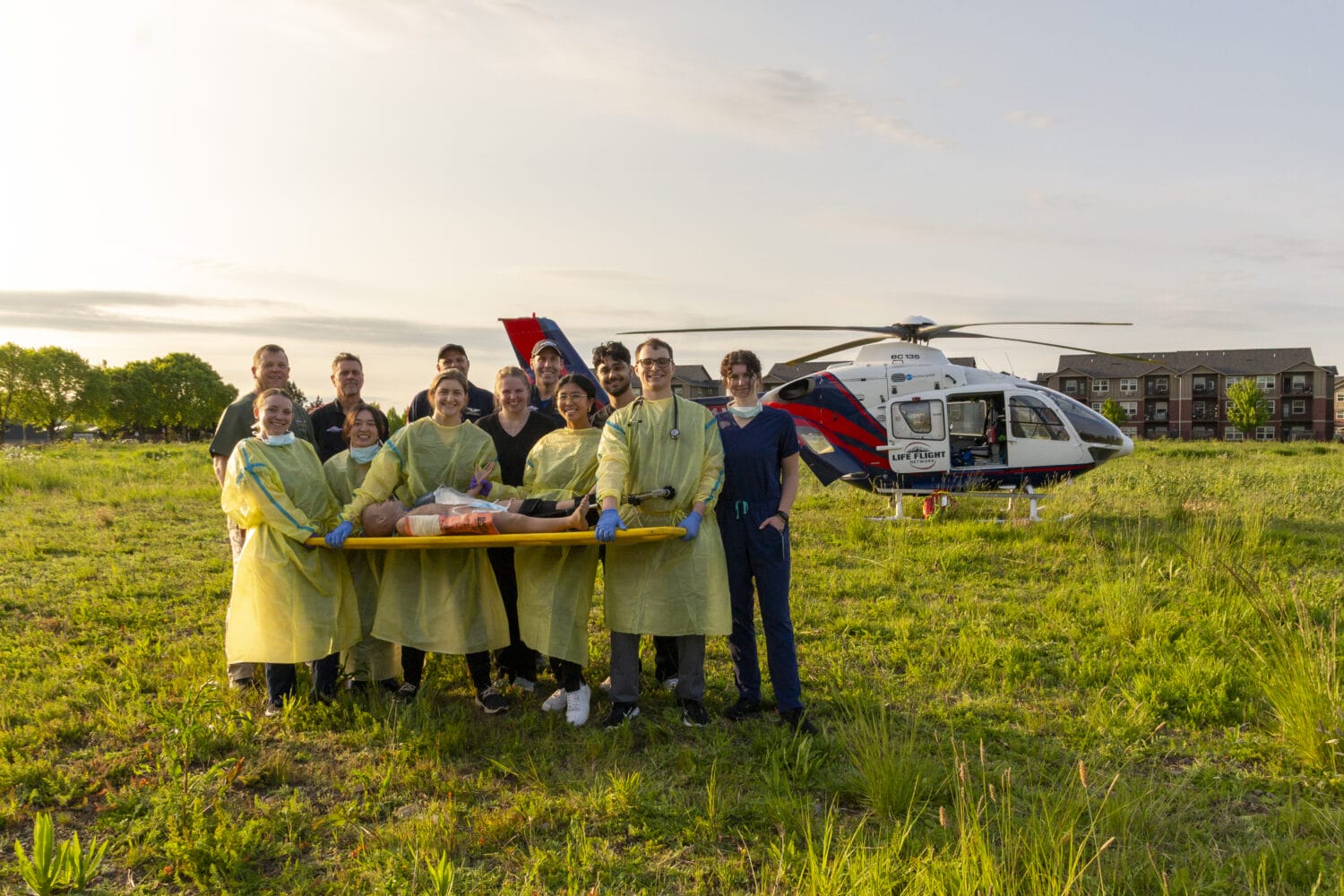WesternU's Austin Lecture speaker challenges and inspires
Western University of Health Sciences students were challenged to become remarkable doctors and to make a difference in their patients’ lives at the 4th Annual Dr. Robert L. Austin Endowed Lectureship in Pediatric Medicine, Pharmacology and Health Care Policy.
The lecture, held April 21, 2015 in WesternU’s Health Education Center (HEC), featured keynote speaker Astrid Heppenstall Heger, MD, Executive Director of the Violence Intervention Project at Los Angeles County-University of Southern California Medical Center, and a professor of clinical pediatrics at USC’s Keck School of Medicine.
She is the preeminent expert in the field of child sexual abuse and assault, and is the author of numerous articles in this field, as well as a definitive textbook, “Evaluation of the Sexually Abused Child,” now in its second edition.
Heger founded the Center for the Vulnerable Child (CVC) in 1984 for the evaluation of child abuse, the first medically based child advocacy center in the world. CVC evaluates more than 15,000 child abuse and child sexual assault victims every year.
In 1995, Heger established the first “one-stop shop” community Family Advocacy Center, offering medical, mental health, protective, legal and social services to victims of family violence and sexual assault throughout Los Angeles County. WesternU presented Heger with its highest honor, the Elie Wiesel Humanism in Healing Award, at its A Tribute to Caring gala Nov. 8, 2014.
Heger talked about pivotal moments throughout her career that prompted her to seek better solutions, including the day when a 7-year-old girl who had been raped on the streets of South Central Los Angeles came to the clinic wearing a dirty, grungy dress made for a 14-year-old.
“She didn’t own underwear and she had no shoes on. She was raped by the railroad tracks. She had dirt ground into every square inch of her body,” Heger said. “As I sat there in my trailer in the back of the pediatric hospital, all I could think about was giving her a bath and buying her underwear. That was my resolution, to never have a moment in time when I didn’t have clothes in my clinic. I don’t want to send any kid out there without socks and shoes on.”
Another patient, a 23-year-old woman living on the street and hooked on meth, was picked up by a group of men, dragged into a storefront and brutally assaulted and stripped naked. She jumped through a plate glass window to escape.
“She was sitting in the ER and nobody would go near her. She’s filthy dirty. She’s been raped. Her feet are bleeding,” Heger said. “All I could think about was, ‘I need a shower and clothes for her.’ I wrapped a blanket around her and put shoes on her feet and walked her to my trailer. Now I have showers. She walked out of there washed, bathed, hair clean.
“Rape victims used to wait for two days to be seen in an ER because nobody wanted to pick up that chart. Everybody blamed the victim, and nobody wanted to go to court. We started the first rape center in the U.S. that was separate and focused on the victims.”
In another episode, a 14-year-old girl was turned into a sex slave by her private-school teacher in Hong Kong after her parents moved to Southern California. The FBI asked Heger to get involved in the case, and she was subpoenaed to go to Hong Kong for the trial. The girls’ parents sat next to her during the trial, where she was called an evil seductress.
“She got smaller and smaller. Her parents leaned away from her and she began to weep,” Heger said. “Outside the courtroom, nobody would go near her. The cop went past her, the D.A. went past her. They made fun of her. Her parents didn’t know what to do.
“I walked up to her, and I put my arms around her and I said, ‘Nothing they said about you was true. You can be anything you want to. You know where I am. I’ll always be there for you. Just don’t believe what was said about you.’”
She wrote Heger a letter 10 years later.
“She said, ‘I never forgot what you said. I’m a graduate student at UCLA. I’m married and I’m expecting my first child. I want to thank you for stopping for a moment,’” Heger said. “And that’s what I’m asking you to do. Stop and talk to people and be personal. Talk to your patients. Figure out what’s wrong with them. We don’t do that. They have all these diseases. When you go on clinical rotations, they’re a gall bladder, or heart disease, or cancer.
They’re not a person. You need to understand and learn to make it personal.”
A 2-year-old boy was killed by his father. Heger and the coroner reviewed the autopsy report, which included proof that the child was repeatedly abused. Yet none of the doctors who examined him while he was alive spoke up.
“Why didn’t they do anything?” Heger said. “It was at that moment that the HUB system in L.A. County, where every kid gets seen if there’s any suspicion of abuse, was born. Everybody was too busy to notice this little boy. It’s too much trouble to make that diagnosis, because you might have to go to court and talk with lawyers, and it takes hours to see these kids. We don’t have time for that. Do we? That’s what I hear, that we don’t have time.”
Heger said she raises $100,000 a year to give to her patients. She makes sure they have food in the refrigerator, running water, and a safe place to live.
“The most effective prevention in the field of child abuse is hooking people up with resources, with people who care about them,” Heger said. “It’s not removing kids from homes. It’s not saying, ‘Stop hitting your kid.’ It is actually providing that single mom with people who make sure she has food in the house, who she can call when she’s depressed or sad or needs something so she doesn’t have to react in an aggressive, angry way.”
Heger challenged WesternU students to be remarkable in the details of their lives and in their work. She said her father, Edward Heppenstall, taught her about “cheap grace,” which happens when you see something you could fix, but you choose not to.
Many people have told her that they can’t believe she does what she does.
“There is no way in a million years I could not do what I do,” Heger said. “I think as medical professionals, we absolutely have to stop this silence, this moral indifference, this sense that it is someone else’s job to take care of these kids.”
The lectureship was established in Dr. Austin’s memory by his wife, Gloria, their children, Charles, Douglas and Lynette, and their families. It is designed to honor and perpetuate his lifelong love of medical practice and his pursuit of pediatric knowledge in the health professions. He was a faculty member at COMP until his retirement in 1981.
Heger addressed Gloria Austin at the end of her talk.
“I have a feeling that your husband was a remarkable doctor, and that’s why we honor him today, and that’s why we want to remember him,” she said. “And that’s why I honor my dad when I speak. He changed my life. He gave me a purpose. He told me you may never, ever be average. You can never not pay attention to the details.”
She then closed by addressing WesternU students: “I dare you to have courage to be remarkable and to not be afraid, and to ask the right questions.”
Following the talk, students lined up to talk to Dr. Heger during a reception in the HEC Recital Hall. The reception hall featured the photographs of nonprofit executive and professional arts curator Paula Stoeke, who volunteers with Heart Gallery Los Angeles to take photos of adoptable children in the Los Angeles County foster care system, with the goal of finding them permanent homes. Her photos are also featured in an exhibit in WesternU’s Pumerantz Library.



